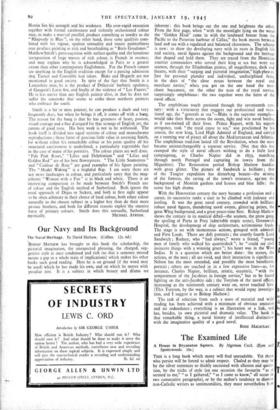Our Navy and Its Background
The Naval Heritage. By David Mathew. (Collins. 12s. 6d.)
Bisitop MATHEW has brought to this book the scholarship, the pictorial imagination, the unexpected phrasing, the charged, sug- gestive style at once condensed and rich (so that a sentence missed means a gap in a whole train of implications) which makes his other books such good reading. Here he is on ground (if the word may be used) which he has made his own, and on which he moves with peculiar zest. It is a subject in which beauty and di:ama are
inherent : this book brings out the one and heightens the other. From the first page, when " with the moonlight lying on the water the ' Golden Hind' came in with the landward breeze from the Pacific to the Peruvian harbour of Callao," the book moves between land and sea with a regulated and balanced choosiness. The scheme is new : to show the developing navy with its roots in English life and society, naval figures against the background and the heritage that shaped and held them. They are traced from the Henrician courtier commanders who served . their king at sea but were not seamen, through the Elizabethan pirates, all magnificence, dash and theatre, with their " surging and pictorial imagination," high phrases. Just ?or personal plunder and individual, undisciplined feats, in the days of " the close nexus between the royal and merchant navies," when you got "on the one hand the mer- chant buccaneer, on the other the men of the royal service, surprisingly amphibious: the two together were the heirs of the naval officer.
The amphibious- touch persisted through the seventeenth cen- tury : - with a virtuousity that staggers our professional and voca- tional age, the " generals at sea"—Blake is the supreme example— would take their fleets across the ocean, fight and win naval battles, as if sea-trained all their lives. Prince Rupert, with his superb arrogance, took " the royal cause to sea," was proclaimed by his cousin, the new king, Lord High Admiral of England, and carried on a running war of piracy all about the Mediterranean and Atlantic. The amphibious tradition lasted till the Revolution, when the navy became uninterchangeably a. separate service. (Not that this has cramped the style of naval officers wishing to do a little land campaigning, as Charles Napier did in 1833, marching through north Portugal arid capturing its towns from the Miguelists). The Restoration period Bishop Mathew handles with great glitter. The picture of Sandwich is brilliant ; that of the Tangier expedition has disturbing beauty—the mining of the fortress, the saving of the town's treasures, against the background of Moorish gardens and houses and blue hills: the scene has high drama.
With the Hanoverian century the navy became a profession and a career, its successive ranks a stair to be climbed with jealousy and jostling. It was the great naval century, crowded with brilliant, robust naval figures, thundering naval events, glittering prizes, the great Whig background, and a great peace-time fleet. Bishop Mathew shews the century in its nautical detail—the seamen, the press gang, the spoiling of Payta in Peru (admirable tropic scene), Greenwich Hospital, the development of ship architecture, acrimonious feuds. The stage is set with momentous actions, grouped with admirals and First Lords. There are deft portraits-; the courtly fourth Lord Sandwich ; Rodney, who "had always," wrote a friend, "young men of family who walked his quarterdeck "; he "could say civil insincere things with a winning grace "; his heart was in the West Indies. It is a question which are better done: the scenes, the actions, or the men ; all are vivid, and their interaction is significant. Nelson has the most extended, and possibly the most beneficent, portrait ; others are touched in in a few expressive lines—as, for instance, Charles Napier, brilliant, erratic, -eccentric, " with the temperament of the Jacobites in foreign service," but to be found fighting on the anti-Jacobite side ; the Toryism of the naval olpcer, increasing as the nineteenth century went .on, never touched him. (This Toryism, by the way, is a subject that would repay investiga- tion, and I suggest it to Bishop Mathew.) The task of selection from such a mass of material and wide reading has been achieved with a minimum of obvious omission and no redundance ; everything is an illustration or a link, and. has, besides, its own pictorial and dramatic value. The book is.. that remarkable thing, a naval history of intellectual distinction with the imaginative quality of a good noveL
ROSE MAC.AULAY.


























 Previous page
Previous page